In social media, taking a break from the constant news flow feels hard to do. No matter the apps you intentionally skip, the time you set aside for screen use or how much you scroll, news is always there, a constant presence that’s challenging to avoid. It almost feels like the only true escape is to cut all forms of media away from your life. But there is danger in doing so. The real challenge is to find a balance between staying informed and not being engulfed by all the tragedies unfolding around us.
It’s crucial to recognize that as you absorb this news through a screen—reading articles and watching videos—you’re distanced from the raw reality of the experiences people are enduring in real-time. While we scroll through updates, it’s necessary to pause and fully grasp that, for others, this isn’t just a news story; it’s their lived reality. In the midst of our digital consumption, acknowledging the urgency and impact on those directly affected is a reminder of the human dimension behind the headlines. It’s essential to be mindful of individuals whose families are directly impacted by the ongoing violence. In our world, the scope of personal experiences is vast and varied, and we often lack insight into everyone’s background. Recognizing our mutual connection prompts a sense of empathy and understanding, urging us to approach current events with a sensitivity to the diverse narratives that exist within our community. But that awareness comes at a cost, and empathy exhaustion is real.
The temptation may be to stop scrolling all together, but taking the time to learn more about the issues at hand can clear up some of those feelings of anxiety. When you dig into the details of what’s going on—whether it’s global conflicts, social problems or crises—you give yourself the tools to truly understand what’s happening. Knowledge, gathered from various sources and different perspectives, helps cut through the noise and gives you a deeper understanding of why things are the way they are. It’s like putting the pieces of a puzzle together. This not only helps you see through sensationalism but also lets you make sense of the root causes and possible solutions. Getting a solid grip on the facts allows you to think critically and understand the many sides of global events, and perhaps what you can do to make an impact. It’s not just about personal know-how; it sets the stage for meaningful conversations, smarter choices and getting involved in making positive changes. Education becomes your guide, turning the overwhelming flood of information into a manageable flow of knowledge that doesn’t just inform but also motivates you to be a part of making the world a better place.
Embracing the belief that “ignorance is bliss” in the context of war and violence in the media has real consequences that extend beyond theoretical concerns. Consider a scenario where individuals remain oblivious to the intricacies of a conflict, unaware of the displaced families, civilian casualties and systemic injustices at play. This ignorance not only encourages apathy but also impedes any collective effort to address the root causes or advocate for diplomatic solutions. It can also be observed in situations where citizens, lacking awareness, are prone to the influence of propaganda or biased narratives, perpetuating harmful stereotypes and obstructing the development of a positive and meaningful conversation.
In contrast, an informed population is aware of the complexities involved, can actively engage in discussions about policies, contribute to peacebuilding efforts and resist manipulation. For instance, during periods of heightened tension between nations, citizens armed with knowledge can demand transparency from their leaders, fostering a climate of accountability and, potentially, reducing the likelihood of escalating violence. Therefore, the harmful implications of embracing ignorance in the face of war and violence are not abstract; they manifest in real-world scenarios where lack of awareness hinders positive change, perpetuates injustice and compromises the potential for global collaboration.
In hindsight, setting boundaries in your news consumption involves intentionally regulating the amount and frequency of exposure to distressing information, particularly in news filled with violence or war. It means designating specific times for news updates, choosing reliable sources and turning off non-essential notifications to prevent constant alerts. Monitoring your emotional state is crucial; if you detect increased stress or anxiety, it’s a sign to take a break. Establishing time limits and creating news-free zones, such as designated spaces or specific moments in your day, helps strike a balance between staying informed and safeguarding your mental health. If needed, communicating boundaries with others who may share distressing news contributes to a healthier relationship with information.
In a world flooded with constant news, finding a balance between staying informed and safeguarding our well-being is an ongoing challenge. Social media demands a thoughtful approach to news consumption, one that acknowledges the human stories behind the headlines and recognizes the interconnectedness of our global community. Embracing knowledge equips us with the complexities of our times, fostering empathy, critical thinking and an active role in positive change. Rejecting the idea that “ignorance is bliss” underscores the real-world consequences of apathy and injustice. Establishing boundaries in our media intake becomes a proactive strategy, enabling us to stay informed without succumbing to the overwhelming flow. As we strive for this balance, remember that our individual actions, fueled by informed awareness and compassion, contribute to shaping a world where understanding triumphs over ignorance and positive change becomes an achievable reality.


